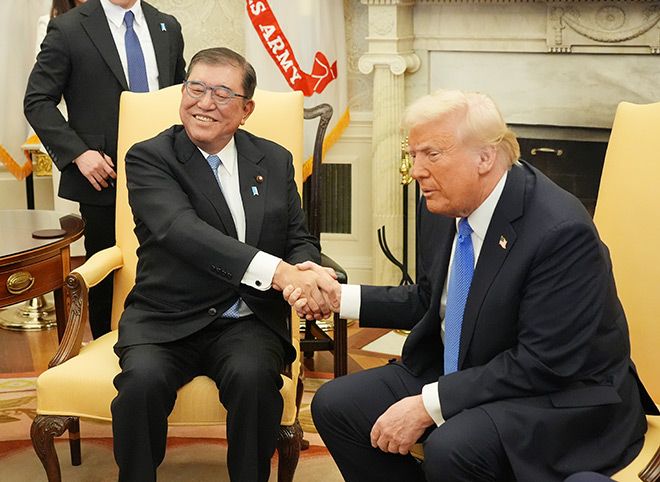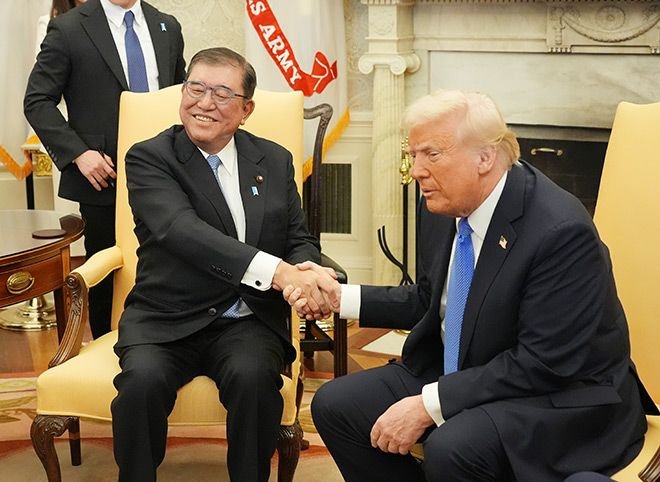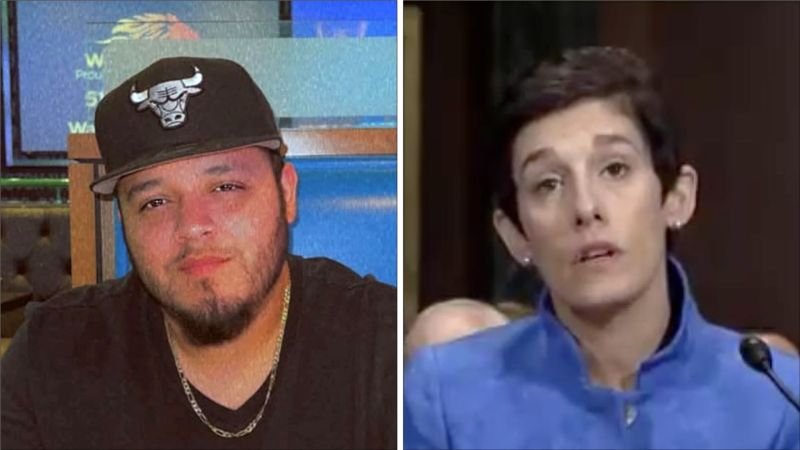Skip to content
Your browser does not support JavaScript, or it is disabled.Please check the site policy for more information.
The Asahi Shimbun
Politics
article
By KAZUAKI ISODA/ Staff Writer
April 28, 2025 at 15:40 JST
 Prime Minister Shigeru Ishiba meets U.S. President Donald Trump at the White House on Feb. 7. (Asahi Shimbun file photo)
Prime Minister Shigeru Ishiba meets U.S. President Donald Trump at the White House on Feb. 7. (Asahi Shimbun file photo)
Despite the long existence of the Japan-U.S. Security Treaty, only 15 percent of Japanese believe the United States “will protect” Japan in the event of a military emergency, a survey showed.
Around 77 percent of survey respondents said they do not think Washington will protect its alliance partner.
Although simple comparisons cannot be made because of differences in survey methods, the ratios of those skeptical of U.S. protection in past surveys had been less than 60 percent.
When asked about Japan’s diplomacy with the United States, 24 percent said that Tokyo “should follow (the wishes of Washington) as much as possible,” while 68 percent said Japan “should be independent as much as possible.”
The nationwide survey was conducted by mail from late February, after Donald Trump was inaugurated as U.S. president for a second time, to early April on 3,000 randomly selected voters.
Valid responses were received from 1,899, or 63 percent.
This year marks the 80th anniversary of the end of World War II.
The United States has played a central role in maintaining international order since the end of the war. But the Trump administration’s policies and “America First” stance threaten to upend the global order.
When asked if they think the international community can rely on the United States to maintain peace around the world, only 3 percent of survey respondents agreed “to a great extent,” while 40 percent agreed “to some extent.”
Forty-eight percent said the international community “cannot rely much on the United States,” and 6 percent said it “cannot rely at all on the United States.”
Although a majority of respondents believe Japan should gain more independence from the United States, 66 percent “disagreed” with the idea of Japan shifting its diplomatic priority to other Asian countries, including China.
Only 16 percent “agreed” with such a change.
The survey also asked whether Japan has done enough to apologize and make amends to the countries and peoples it has harmed through war and colonial rule.
Fifty-eight percent said Japan “has done enough,” while 29 percent said that it “has not done enough.”
In a mail survey conducted 10 years ago, 57 percent said Japan had done “enough” to apologize and make amends, while 24 percent said the country had not done enough.
When asked whether Japanese politicians should continue to convey messages of apology to countries damaged by Japan, 47 percent of respondents said “there is no need,” while 44 percent said such messages should continue.
The results were slightly reversed from 10 years ago, when 46 percent of survey respondents said politicians “should continue to convey messages of apology,” and 42 percent said “there is no need.”
Among respondents in the latest survey who support the ruling Liberal Democratic Party, 41 percent said messages of apology “should continue,” and 50 percent said there is “no need.”
When asked whether Japan should ratify the U.N. Treaty on the Prohibition of Nuclear Weapons, 73 percent of respondents said the country “should join,” far exceeding the 22 percent who said Japan “should not join.”
As for Japan’s reliance on the U.S. nuclear umbrella for security, 38 percent said it is “necessary,” while 55 percent said it is “unnecessary.”
Among those who said the reliance is not necessary, 82 percent feel that Japan should join the anti-nuclear weapons treaty. The ratio was 65 percent among those who said Japan’s reliance on the U.S. nuclear umbrella is necessary.
The survey also asked respondents if they felt that the Japanese government was “earnestly working” to eliminate nuclear weapons from the world.
Only 19 percent said the Japanese government is “earnestly working” toward that end, while 77 percent said they “don’t think so.”
In an interview survey conducted in June 1985, 40 years after the end of World War II, 21 percent of respondents said the Japanese government was “earnestly working” toward abolishing nuclear weapons, while 61 percent said they didn’t think so.
Japan’s basic stance is to act as a “bridge” between nuclear weapon states and non-nuclear weapon states toward the elimination of nuclear weapons.
However, the survey results show dissatisfaction with the government’s efforts.
Survey: 51% oppose extension of ‘Go To Travel’ campaign
As numbers thin, hibakusha ask who will warn of nuclear war
Survey: 67% of Japanese favor sanctions against Russia
Most lawmakers loath to respond to survey on nuke ban treaty
Student petitions city assembly to ask Japan to join nuke ban treaty
Survey: 41% OK with corporal punishment against children
New tour of Akiyoshido cave takes in areas off-limits in past
April 26, 2025
4 pandas at Wakayama zoo will be returned to China in June
April 25, 2025
Foreigners flock to Tokyo government building for free light show, views
April 22, 2025

Information on the latest cherry blossom conditions. (The page is in Japanese. Please right click to use your browser’s translation function.)

A series based on diplomatic documents declassified by Japan’s Foreign Ministry

Here is a collection of first-hand accounts by “hibakusha” atomic bomb survivors.

Cooking experts, chefs and others involved in the field of food introduce their special recipes intertwined with their paths in life.

A series about Japanese-Americans and their memories of World War II
In-house News and Messages
BACK TO TOP
Copyright © The Asahi Shimbun Company. All rights reserved. No reproduction or republication without written permission.



